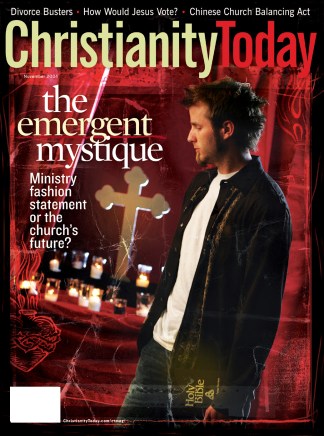On September 1, Irina Gigouev and her two sons, Mark, 9, and Arthur, 8, were softly singing hymns in the sweltering gym of Beslan Middle School No. 1. A terrorist gripping a machine gun stood guard menacingly behind her. Irina held Arthur tightly and prayed aloud for God to touch the man. Hours later, shrapnel hit Arthur’s head and his body went limp in her arms.
The three-day hostage siege by Chechen separatist fighters ended in a bloodbath after Russian forces stormed the school. Flying bullets and exploding bombs left 338 dead, including many children.
“After her son was killed, I saw Irina praying for that terrorist again,” said Yuri Sipko, president of the Union of Evangelical Christians—Baptists, after visiting the town of 30,000 in North Ossetia, a republic in Russia’s north Caucasus region.
Sipko and other evangelical leaders across Russia have publicly urged peace, concerned about the region’s ethnic tensions. During his visit, Sipko spoke on a Christian radio network and met with church leaders. “We prayed that God would surround the community despite the thirst for revenge in the air,” he told CT.
Connie Snyder, vice president of Washington-based International Christian Concern, credits Russian believers with actively extending forgiveness. “This isn’t an easy task, but with God’s strength it can be done,” she said.
Some Beslan residents clamored for revenge after learning the hostage takers were mostly Ingush and Chechens. A territorial dispute between mostly Orthodox Christian North Ossetians and Muslim Ingushetians led to fighting in 1992.
Like Irina Gigouev, many of Beslan’s evangelical Christians, grieving the loss of children, mothers, and fathers, prayed, comforted neighbors, and urged forgiveness instead of revenge even as they buried their dead.
“It’s not just by chance this happened. I think God wants to do a miracle here through the Christian community,” said Taymuraz Totiev, pastor of the Evangelical Christian Baptist Church, Beslan’s largest evangelical congregation. Totiev and his brother and co-pastor, Sergei, lost six children at the school. At their children’s memorial service, Sergei stood and addressed crowd members who began cursing and vowing to take revenge. “Yes, we have an irreplaceable loss, but we cannot take revenge. As Christians, the Bible teaches us that we must forgive. Vengeance is in God’s hands.”
Although most of Beslan’s residents are nominally Orthodox and attend services mainly on holidays, churches were packed the Sunday after the disaster.
“Russians say this is their September 11th,” said Anita Deyneka, president of Russian Ministries, based in Wheaton, Illinois. “People are looking to Christians because they have hope. They’re not filled with hatred.”
Beslan’s evangelical churches rapidly mobilized to visit the wounded in hospitals and distribute aid to hostages’ families. They also plan to deliver Bibles to homes and expand Sunday school outreach.
Russian Ministries has already launched a trauma-counseling center in Beslan staffed by trained Russian Christians. Eventually the counseling center will turn into a youth center that equips young people with peacemaking skills.
Said Pavel Tokarchuk, a Muscovite who helped mobilize and encourage Beslan’s Christians: “Pray that God would use this situation for good.”
Copyright © 2004 Christianity Today. Click for reprint information.
Related Elsewhere:
The European Baptist Federation has more information on the tragedy in Beslan.
Russian Ministries has a special report on the Beslan tragedy.
More Christianity Today coverage of Russia includes:
Liturgy vs. Opium | Orthodox use prayer and sacraments to heal drug addicts in Russia. (Dec. 20, 2002)
Growing Protestants, Catholics Draw Ire | New law would expand special status for Russian Orthodoxy. (June 07, 2002)
Council Voids New Religious Restrictions | Kazakhstan ban on unregistered groups found to violate the nation’s constitution. (June 06, 2002)
Salvation Army Eyes Registration Victory | After a long legal battle in Moscow, the Army gets hope “that there is justice.” (April 01, 2002)










